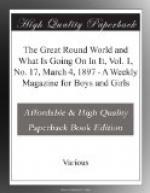It seems that the boys at the Convict endured many privations. The practice-room was unbearably cold in winter, and the young students were allowed to go without food for eight hours and a half, between a “poor dinner and a wretched supper.” When he was about fifteen, Franz wrote to his brother, explaining his position, his hungry longing for a roll or an apple, and concluded in these words: “I rely on the teaching of the Apostle Matthew, who says, ’Let him that hath two coats give one to the poor.’ Meanwhile I trust you will listen to the voice which unceasingly appeals to you to remember your loving, hoping, poverty-stricken—and once again I repeat poverty-stricken—brother Franz.”
His earliest composition for the piano is dated April, 1810. It was his habit to date all his pieces. In March, 1811, he composed a long vocal piece, “Hagar’s Lament over Her Dying Son.” His boy friends at the Convict were devoted to him, and were eager to play, sing, or copy any of his compositions. One of them, Josef Spaun, who was several years older than Schubert, and better off, helped him to procure all the music paper he needed.
His first mass, in F, was composed and performed in 1814. It is said to be the most remarkable first mass ever produced, excepting Beethoven’s in C. In 1815, when he was only eighteen years old, he composed the music for more than a hundred songs. The fine song, the “Erl King,” was written in this year, and many of his boyish songs are among his finest productions. When he died in 1828, he left more than 1,100 compositions, the greater number of which had not then been published.
In his lifetime, some of his songs were sold for a few pence, and he lived in poverty nearly all his days. Yet publishers have grown rich by the sale of his compositions, and his work is a delight to the world. The house in which he was born is marked by a marble tablet, and costly memorials have been raised in his honor. Some words that he spoke in the delirium of his last illness made his brother Ferdinand believe that he wished to be buried near Beethoven. This wish was fulfilled, and his grave lies near that of the great musician, for whom from his early boyhood he always had a profound reverence and admiration.
M. BOURCHIER SANFORD.
INVENTION AND DISCOVERY.
There has lately been patented in England a system for making buttons, combs, brush-handles, billiard balls, and such like articles out of milk.
The bone buttons and articles of that kind, which we have been using up to the present time, have been made of refuse from the slaughter-houses. This new process will only require milk.
Any one who knows anything about dairy work knows what loppered milk is. It is the thick soured milk that one finds under the butter cream.
This loppered milk is made into cottage cheese, and many people, in making their cottage cheese, stand it for a moment on the fire to thicken.




